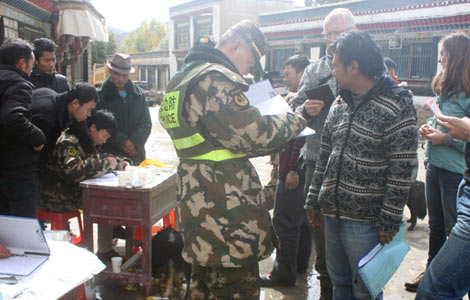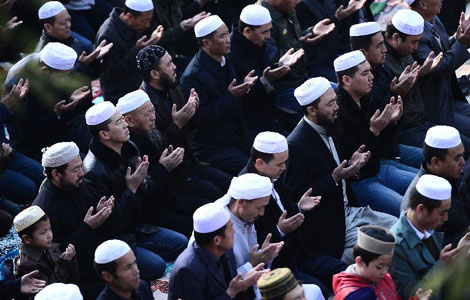Shutdown has already taken a toll on bilateral ties
Updated: 2013-10-16 11:21
By Chen Weihua (China Daily USA)
|
||||||||
With US government partial shutdown entering its 15th day on Tuesday and a debt ceiling deadline set to arrive on Thursday, Republicans and Democrats continue with their tug-of-war. The stalemate in Washington has caused widespread concern around the world and has already taken its toll on China.
Some of China's most influential military thinkers and policymakers, including several general officers, were due to come to the US this week for a series of long-arranged meetings at the US Army War College, followed by private discussions at some of Washington's more prominent think tanks. But last Wednesday, the US Army said it had to cancel the meetings because the funds to host the Chinese had dried up, Foreign Policy magazine reported.
"After the American democratic process provides the Army with funding to conduct international activities, we look forward to rescheduling this exchange at both sides' earliest possible convenience," the Army was quoted as saying.
The Chinese media and netizens have responded to the news with shock. The headline: "US: No money to receive Chinese military delegation" appeared on numerous online sites, with some expressing bewilderment over the fact that the US military spent more than a trillion dollars in Iraq and Afghanistan but had no money to receive a few Chinese officers.
The sudden postponement of the trip came at a time when the bilateral military relationship between the two nations - long regarded as lagging behind other dimensions such as trade and culture - had been warming up.
Chinese Defense Minister Chang Wanquan visited the US in August, followed by a trip by Wu Shengli, commander-in-chief of the Chinese People's Liberation Army Navy. During Wu's trip, three Chinese naval ships arrived in Hawaii for a joint search and rescue drill.
China has accepted a US invitation to participate for the first time in the Rim of the Pacific exercise in 2014 off Hawaii, the world's largest naval drill.
The Chinese military delegation originally set to arrive this week was supposed to be led by Major General Yao Yunzhu of the Chinese Academy of Military Science. The 59-year-old Yao, who holds a doctorate from the academy, was in the limelight at the Shangri-La Dialogue in Singapore on June 1 when she challenged US Secretary of Defense Chuck Hagel to better explain the US military buildup across the Asia-Pacific region. She also questioned how Hagel can assure China that kind of military deployment is part of an effort to build a more positive relationship with Beijing.
While the postponement of the group's visit may not have a direct impact on bilateral military ties, the inability of NASA (the National Aeronautics and Space Administration) to correct its mistakes regarding Chinese scientists might have a lingering effect.
NASA had denied several Chinese scientists attendance at the Second Kepler Science Conference at NASA's Ames Research Center in California, citing restrictions in a Congressional regulation. But after realizing that the regulation was interpreted improperly, NASA officials said a correction was now impossible, since approvals had to be entered into a computer system at NASA headquarters in Washington DC, where most employees were then on furlough.
Scientists have expressed their outrage at NASA and some have threatened to boycott the conference.

Compared to the above two episodes, the possible US debt default on Thursday has caused far more anxiety in China. China is the largest foreign holder of US treasury bonds. A US Treasury Department report shows that China held $1.277 trillion US treasury bonds by the end of July, followed by Japan at $1.135 trillion. Meanwhile, China's central bank reported on Sunday that the country's foreign currency reserve reached $3.66 trillion by the end of September, up $160 billion compared to the end of June.
Many worry that a US debt default will pose an enormous threat to the mostly US dollar denominated assets.
Zhu Guangyao, China's deputy finance minister, and Yi Gang, deputy governor of the People's Bank of China, the central bank, both expressed concern last week over a possible US debt default.
IMF Managing Director Christine Lagarde issued a stern warning last week that failure to lift the $16.7 trillion debt limit by Oct 17 will have fiscal consequences for the US and financial consequences for not only the US, but across the globe.
Contact the writer at chenweihua@chinadailyusa.com
(China Daily USA 10/16/2013 page2)
Most Viewed
Editor's Picks

|

|

|

|

|

|
Today's Top News
Hong Kong, AmEx host culinary feast
Yao, NBA to open training school for teens
IMAX in China exceeds CEO's expectations
China-UK cooperation projects inked
A life devoted to China-US ties
US inches toward deal to reopen govt
Beijing-Tokyo ties 'unlikely to recover soon'
Chinese firm in talks to buy NJ site
US Weekly

|

|














